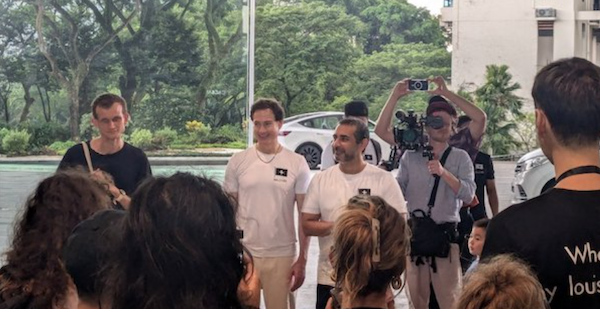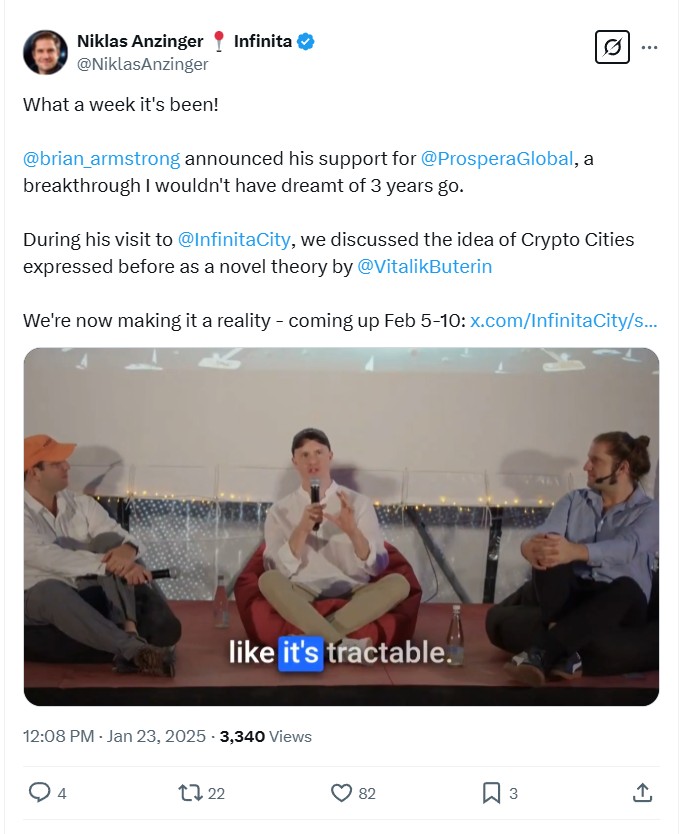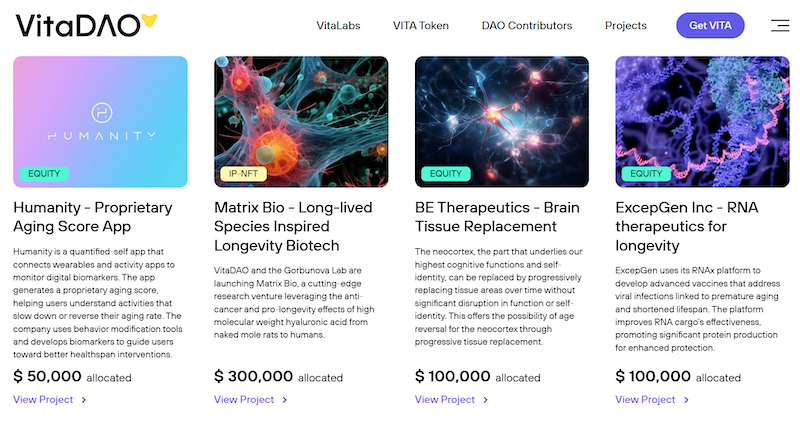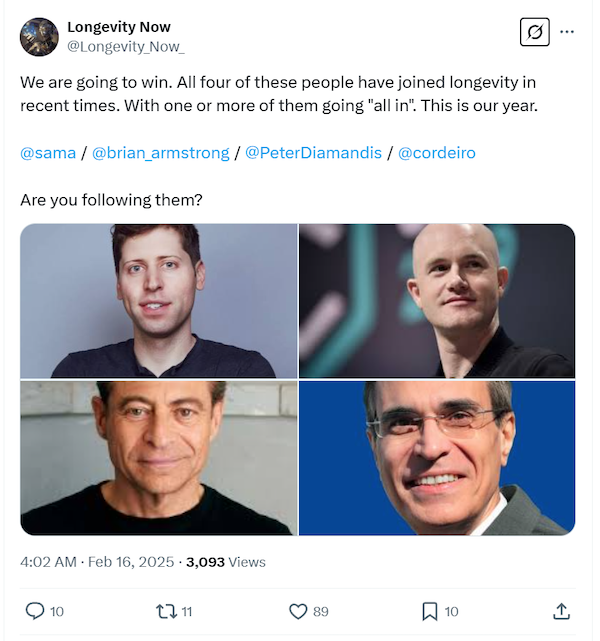Longevity Craze: Crypto’s Obsession with Biohacking

From crypto world luminaries like Vitalik Buterin and Balaji Srinivasan, to industry leaders like Brian Armstrong and even the outspoken Roger Ver, it appears a peculiar trend is emerging: achieve crypto billionaire status, then immediately set your sights on unlocking the secrets of immortality.
Back in early 2020, as the pandemic threw mortality into sharp relief for everyone, Vitalik Buterin mused online: “Might I suggest anti-aging research? Seriously, aging is a humanitarian crisis on a massive scale, wiping out as many people every two years as World War II did… Let’s put an end to it.”
And he’s not just talking the talk. Buterin backed up his words with action, donating a staggering 46 trillion SHIB tokens the following year to the Future of Life Institute – a gift that clocked in at a jaw-dropping $665.8 million. Beyond that, he’s also funneled millions more into organizations like the SENS Research Foundation and the Methuselah Foundation.
Meanwhile, Bitcoin OG Roger Ver is planning for cryogenic preservation upon his death, in the hopes of a future revival. Tron founder Justin Sun has pledged a cool $51 million to the Longevity Prize. And Cardano’s main man, Charles Hoskinson, has invested $100 million in a Wyoming clinic with ambitious plans to trial a cutting-edge therapy combining stem cells and hyperbaric oxygen chambers.


Intriguingly, Hoskinson isn’t just funding this venture, he’s signed himself up to be the very first guinea pig.
“If my thinking is right, we’re talking about potentially reversing aging by over a decade,” Hoskinson revealed to DL News. “And I’m absolutely going to be the first in line, the very first person to try it out. Let’s face it, I’m getting a bit rounder and older, and the idea of living longer and feeling healthier is pretty appealing.”
But what’s the real story behind this connection between crypto enthusiasts, these believers in “magic internet money,” and this all-out war against aging? The answer, as it turns out, is more profound and perhaps a little stranger than you might initially imagine.




Longevity: The One Challenge Crypto’s Wealth Can’t Yet Conquer
Benji Leibowitz, the brains behind the longevity research token platform Pump.science, shared with Magazine that it’s a perfectly logical next step for crypto millionaires to aim for a problem that their fortunes can’t immediately fix.
“Many of us initially dive into crypto to tackle the ‘money problem.’ But once that’s sorted and financial resources become abundant, people start to realize that time itself is now their most precious, limited resource. So, naturally, they look to leverage their wealth to buy more of it,” he explains.
“Crypto, at its core, is quite audacious. And I think it takes a similarly audacious mindset to believe you can actually defeat death… To have that kind of ‘engineer your way out of anything’ mentality.”
“I believe it’s a cocktail of this untamed, ‘Wild West’ spirit combined with bottomless resources and the stark reality of finite time,” he concludes.


Former Coinbase CTO, Balaji Srinivasan, certainly embodies this description, making longevity a core theme of his ambitious Network School program, collaborating with “Don’t Die” millionaire, Bryan Johnson.
Johnson himself confessed to Magazine last year that if he hadn’t become utterly consumed by the mission to eliminate aging, he’d be neck-deep in crypto. “There’s a very real possibility my whole life could have been crypto,” he admitted. However, even he was puzzled about the inherent link between the two seemingly disparate worlds.
“To be honest, I’m not entirely sure I get it either,” he mused. “But the connection seems to be that they’re parallel paths – if you gravitate towards one, you’re likely drawn to the other.”
“Bitcoin is fundamentally a rejection of inflation, and for me, it’s fundamentally rejecting aging. We essentially accept these slow, drawn-out deaths – both crypto and longevity are about rejecting that slow burn.”


Brian Armstrong Pledges 2% of Coinbase Stake to Longevity Research
Going back to 2022, Coinbase CEO Brian Armstrong revealed his plan to dedicate 2% of his stock in the publicly traded exchange to fuel longevity research. The following year, he co-launched New Limit, a startup with the ambitious goal of dramatically extending human lifespan.
“Longevity feels like a problem we can actually solve,” Armstrong stated this January. “Someone, or perhaps many people, could make a real breakthrough in this area within the next decade. It’s not some far-off ‘time travel’ fantasy. It’s something incredibly challenging but achievable. And that’s exactly the sweet spot – something worthwhile to pursue. You want to get in early, but at the right time.”
He also made a significant contribution to the Dog Aging Project, a study running clinical trials to assess if the drug Rapamycin can slow down aging in dogs. Co-director Matt Kaeberlein mentions that he had numerous conversations with Armstrong leading up to the donation.
“Brian is clearly incredibly intelligent, but also very thoughtful,” Kaeberlein notes. He explains that New Limit is “focused on epigenetic reprogramming,” adding, “…so I know it’s an area he’s deeply passionate about and is investing a considerable portion of his personal wealth into.”
Kaeberlein himself is a highly respected figure in longevity research, with over 200 scientific publications to his name. He’s also the founder of Optispan, a health optimization tech company, and leads the Healthy Aging and Longevity Research Institute at the University of Washington.


Over the last half-decade, he’s observed an upswing in funding for longevity research originating from the crypto community. He also points out that tech titan Jeff Bezos poured investment into regenerative medicine firm Altos in 2021, and Google committed $1.5 billion to establish the California Life Company, or Calico.
“I think there’s a really organic connection between the tech world, the crypto world, and the longevity movement,” he suggests, describing them all as “big thinkers, people who tend to operate outside conventional boundaries and maybe even have a bit of a rebellious streak against traditional approaches.”
Leibowitz proposes that some in the tech sphere view aging simply as another engineering puzzle waiting to be cracked. Yet, while Kaeberlein agrees that aging is possibly “the unsolved problem” in human health, he emphasizes that it’s far more intricate than many anticipate.
“You definitely see individuals with an engineering mindset entering aging biology with that kind of outlook. But once they delve into the actual science, they come to realize it’s significantly more complex than it appears from a distance. Engineering a solution around aging isn’t as straightforward as one might hope,” he explains.
“But, of course, who knows? Maybe if we unravel enough of its mysteries, we actually *can* get there.”
Crypto to the Rescue: Longevity Research Remains Underfunded
Dr. Max Unfried, a research fellow at the National University of Singapore’s Center for Healthy Longevity, tells Magazine that while Big Tech and crypto donations are certainly welcome, they can create a misleading impression of abundant funding in longevity research. The reality is, the vast majority of funding still flows towards treating existing diseases, not pursuing the underlying goal of extending lifespan.
Case in point: in the United States, the National Cancer Institute’s budget dwarfs the funding allocated to Aging Biology research at the National Institute of Aging by roughly 20 times.
“There’s a common perception about aging research that there *should* be plenty of money available,” he says, quickly adding, “but that’s simply not the case.” “And this is where crypto steps in. It can actually channel resources into research areas – including aging – that wouldn’t typically receive funding through conventional channels.”
Numerous Decentralized Autonomous Organizations (DAOs) have emerged to fill this gap, funding experimental research often with the promise of tokenizing any resulting intellectual property. Unfried is a former member of VitaDAO, a prominent example boasting 10,000 members, dedicated to funding longevity research and tokenizing promising treatments.


Srinivasan and Armstrong have both contributed to VitaDAO, which also has connections to longevity token trading platforms like Molecule and Pump.science.
Beyond VitaDAO, there’s a growing ecosystem of more specialized DAOs, including HydraDAO (focused on biological replacement parts), CryoDAO (cryogenics), BiohackerDAO (life extension hacking), and Rejuve.ai (leveraging crypto to incentivize crowdsourced health data).
While these projects don’t represent massive sums in crypto terms – VitaDAO’s treasury holds around $6 million in liquid assets, having funded roughly 24 research projects with $4.2 million to date – within the often-underfunded landscape of longevity research, it’s a significant contribution.
“A few million in crypto funding is actually a comparatively large percentage, especially if you’re aiming for more ambitious, ‘moonshot’ style research,” Unfried points out.
And developing a truly game-changing longevity drug *is* a moonshot. As of early 2025, there are no FDA-approved drugs specifically targeting aging, though some existing FDA-approved treatments, like Metformin, Rapamycin, and the weight loss drug Semaglutide (Ozempic, Wegovy), have shown potential in trials.
Read also
Features
Can Crypto be Sweden’s Savior?
Features
I spent a week working in VR. It was mostly terrible, however…
Crypto’s Hacker Ethos Spills Over into Longevity Biohacking
Alex Miloski, co-lead of the Web3 pod at VitaDAO, believes that the inherent “hacker” mindset within crypto circles naturally draws some individuals to the field of accelerated biotech.
“The longevity space sits right at that intersection because it’s fundamentally about ‘hacking biology,’ right? It’s about challenging the ‘natural’ progression of aging. So, I think this hacker mentality plays a significant role in the crossover,” he explains.
“It’s an area that has historically been underfunded and undervalued, and it’s essentially trying to disrupt the entire healthcare paradigm. If we manage to solve aging, the healthcare system as we know it will be transformed. So, there’s a conceptual parallel between what crypto aims to do for finance and what we’re trying to achieve in healthcare.”
One DAO that embodies this biohacking approach literally is BiohackerDAO. It sprung up early last year after a group of biohackers connected at the Vitalia longevity pop-up city in Honduras.
Mgoes, a founding steward, notes that the community spans ages from early 20s to late 60s, with a significant number working in crypto, tech, or health-focused startups.


They are “enthusiasts about Biohacking, cellular enhancement and just generally dedicating their free time, money, and resources to self-experimentation and tracking their own biomarkers – a bit like Bryan Johnson, but perhaps on a slightly less extravagant spending level.”
Last November, the DAO raised $1.3 million through Juicebox, with members actively discussing and voting on the experiments and research projects they wish to support. Early research on the platform has explored topics like whether intranasal insulin can enhance cognitive function and the impact of EMF radiation on sleep quality. In December, BiohackerDAO launched Intra, hailed as the “world’s first tokenized biomarker data marketplace,” designed for trading data collected from fitness trackers.


Biohacking Your Way to Longevity, or Even Immortality?
Mgoes says he’s given considerable thought to the underlying reasons for this convergence of crypto and longevity communities.
“Crypto people are typically very tech-oriented, and longevity or biohacking is essentially about applying technology to biology, to the human body itself. It’s arguably one of the most significant, yet largely untapped, frontiers of technology that we have,” he suggests.
This biohacker also believes that crypto’s libertarian spirit extends to valuing “self-autonomy over your own body, empowering you to decide what substances you introduce into it,” in addition to fostering a mindset of rethinking established paradigms.
“These individuals often share a mindset that challenges established systems,” he elaborates.
“It’s about saying, let’s fundamentally rethink our conceptions of healthcare, and even our ingrained notions of human limitations, particularly our lifespans. Let’s tackle this concept of mortality and the body’s natural decay from first principles.”
Some of these ideas veer into the realm of “transhumanism,” a philosophical and intellectual movement advocating the use of technology to help humanity transcend its current biological limitations. Mgoes notes that “guiding, shaping, directing, and even accelerating human evolution … These are really pivotal concepts within transhumanism, and it’s something that we, within BiohackerDAO, genuinely resonate with.”
Read also
Features
Bitcoin 2022 — Will the real maximalists please stand up?
Features
The legal dangers of getting involved with DAOs
Transhumanists, Crypto, and the Quest for Longevity
One of the most prominent transhumanist figures in the crypto space is Ben Goertzel, founder of SingularityNet and the person who popularized the term “artificial general intelligence” (AGI). SingularityNet’s Beneficial AGI conference in Panama last year drew a diverse range of well-known transhumanist thinkers, including Venezuelan futurist José Cordeiro.
Cordeiro is a firm believer that AI will be instrumental in achieving Longevity Escape Velocity by 2030. This refers to a hypothetical tipping point where medical advancements extend lifespan by more than a year for every year that passes. (Intriguingly, this concept was also the subject of one of Magazine’s most-read stories of 2024.)


Cordeiro explained to Magazine that the link between the crypto and longevity communities seems quite straightforward to him. “My belief is that people involved in crypto tend to be very forward-thinking. Over time, they naturally become interested in all sorts of future-oriented topics. This certainly includes longevity, and, of course, the idea of living forever… and staying young while doing it,” he says.
It’s true that transhumanism, especially its more speculative, almost science-fiction-esque concepts, can make many people outside the movement feel quite uneasy.
Matt Kaeberlein, with his more traditional academic perspective on longevity, states he doesn’t necessarily object to transhumanism or “what some might consider the more fringe elements of the longevity space.” However, he does caution against exaggerating the current state of progress in the field.
“I think it can actually be harmful when it’s discussed in a way that isn’t grounded in scientific reality,” he elaborates. “There’s nothing inherently impossible about stopping or even reversing aging according to our current understanding of biology. We simply haven’t achieved it yet. And I think anyone truly familiar with the science, and being honest about it, would have to agree that we still seem quite a distance away from that ultimate goal.”
From his viewpoint, talking about extending human lifespan by 500 years as if it’s just around the corner actually minimizes the significance of the much more realistic and attainable advancements we are likely to witness in the near future.
“We’re nowhere near 500 years. But I think we’re quite possibly close to adding 20 years of healthy life. And that’s my worry – that overblown claims can diminish the genuine impact of the progress we *are* making.”
Subscribe
The most engaging reads in blockchain. Delivered once a
week.




Andrew Fenton
Based in Melbourne, Andrew Fenton is a journalist and editor covering cryptocurrency and blockchain. He has worked as a national entertainment writer for News Corp Australia, on SA Weekend as a film journalist, and at The Melbourne Weekly.
Read also
Hodler’s Digest
SEC reviews Ripple ruling, US bill seeks control over DeFi, and more: Hodler’s Digest, July 16-22
Editorial Staff
7 min
July 22, 2023
The SEC examines the ruling in the Ripple case, a U.S. Senate bill seeks to regulate DeFi, and the poor performance of altcoins in the second quarter of 2023.
Read more
Hodler’s Digest
Paxos’ $500K Bitcoin fee, FTX tokens sales set to begin and other news: Hodler’s Digest, Sept. 10-16
Editorial Staff
6 min
September 16, 2023
Paxos makes a mistake, pays $500k in Bitcoin transfer; FTX receives court approval for token sales, and Gemini Earn users receive plan for fund recovery.
Read more













